Liber Quodlibetatrius – UER MS.B 200 – Fechtbuch
Inhalt:
zurück zur Einleitung
118r
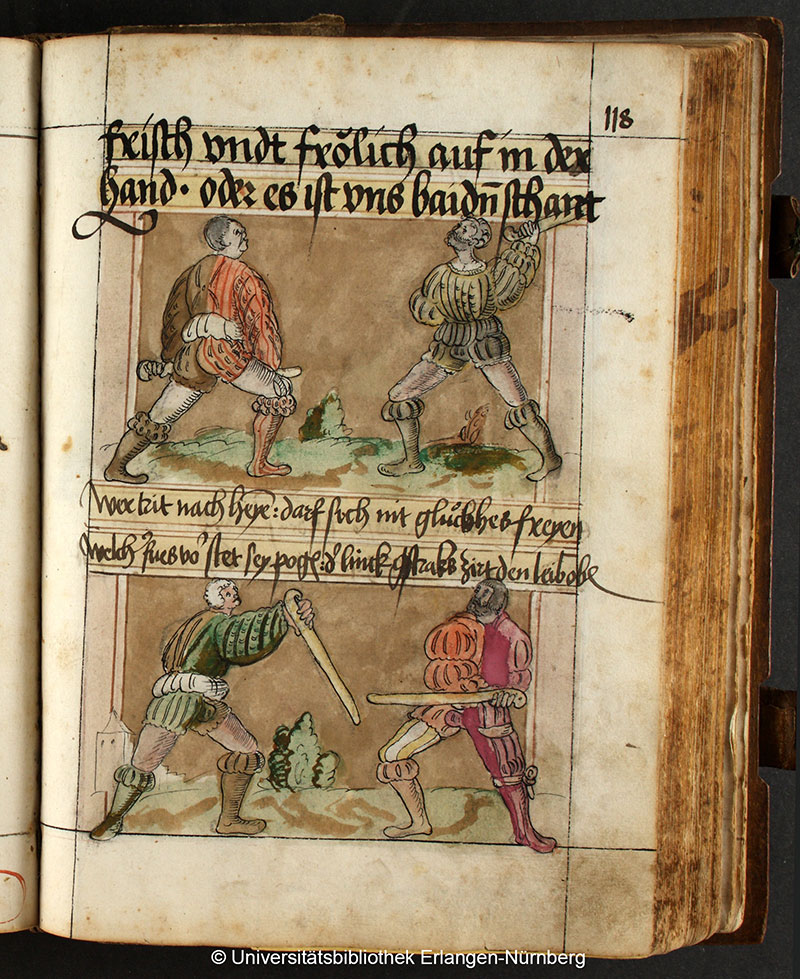
frisch vndt frolich auf in der hand • oder es ist vns baid(e)n schant
Wer trit nach heye(n): darf sich nit gluckhes freyen
Welch(er) fues vo(n) stet sey poge(n): d(er) linck gstraks zirt den leib obe(n)
Lively and spirited, [with weapon] in hand; or it will shame the both of us.
He who steps after cutting, will not be happy with his luck.
Whichever leg is forward, should be bent; the left extended; hold the body upright.
118v
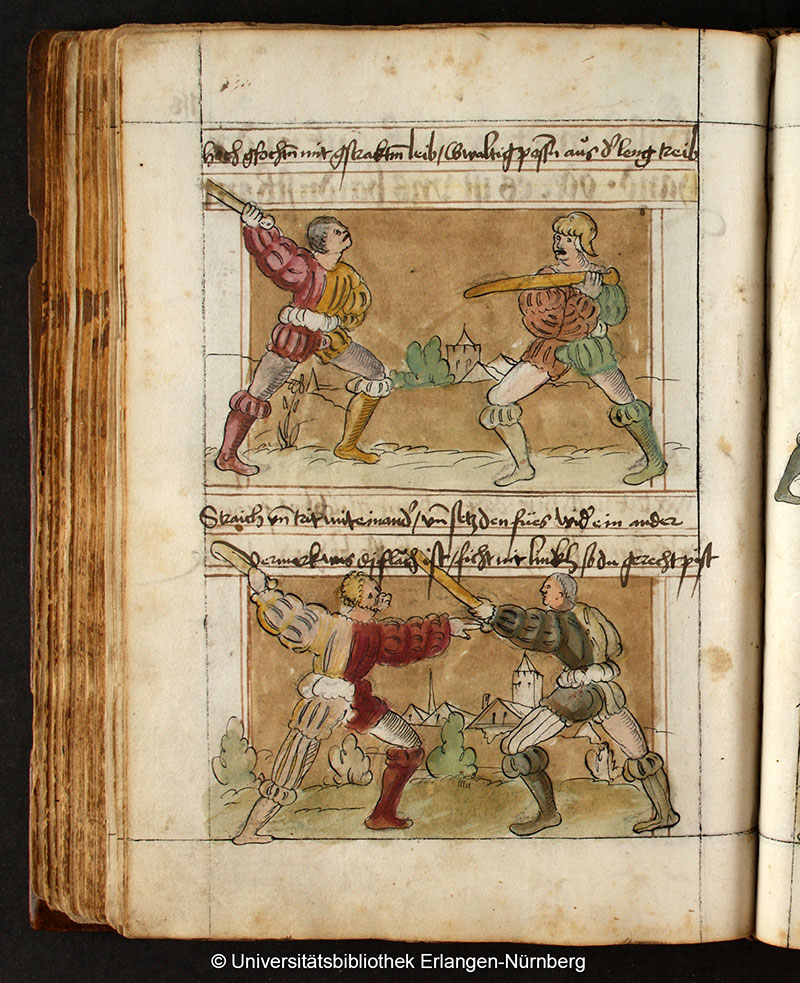
hoch gfocht(e)n mit gstrakt(e)m leib / Gwaltig poss(e)n aus d(er) leng treib
Straich vn(d) trit miteinand(er) / vn(d) setz den fües wid(er) ein ander
Vermerk was dj flӑch ist / ficht nit linkh so du gerecht pist
Fence on high with your body stretched; make your attacks with force from a distance.
Strike and step with one another; and set the feet against each other.
Note what the flat is; don’t fight from the left if you are right-handed.
119r
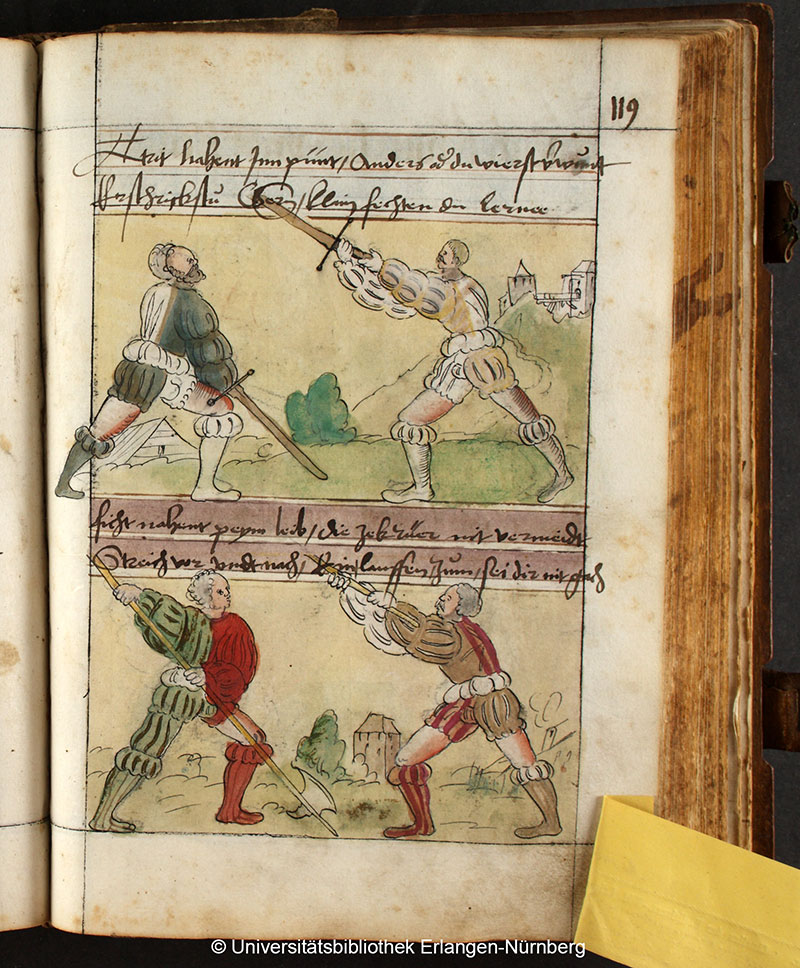
Trit Nahent Inn pünt / Anders od(er) du wierst v(er)wunt
Erschrickstu Gern / klain fechten du lernee
ficht nahent peym leib / die zekrüer nit vermeidt
Streich vor vndt nach / Einlauffen / zum / sei dir nit gach
Step close in the bind; otherwise you will be wounded.
If you scare easily, don’t learn how to fence.
Fight close at the body; don’t avoid (giving) light hits.
Strike ‘before’ and ‘after’; don’t be too quick to run in close.
119v
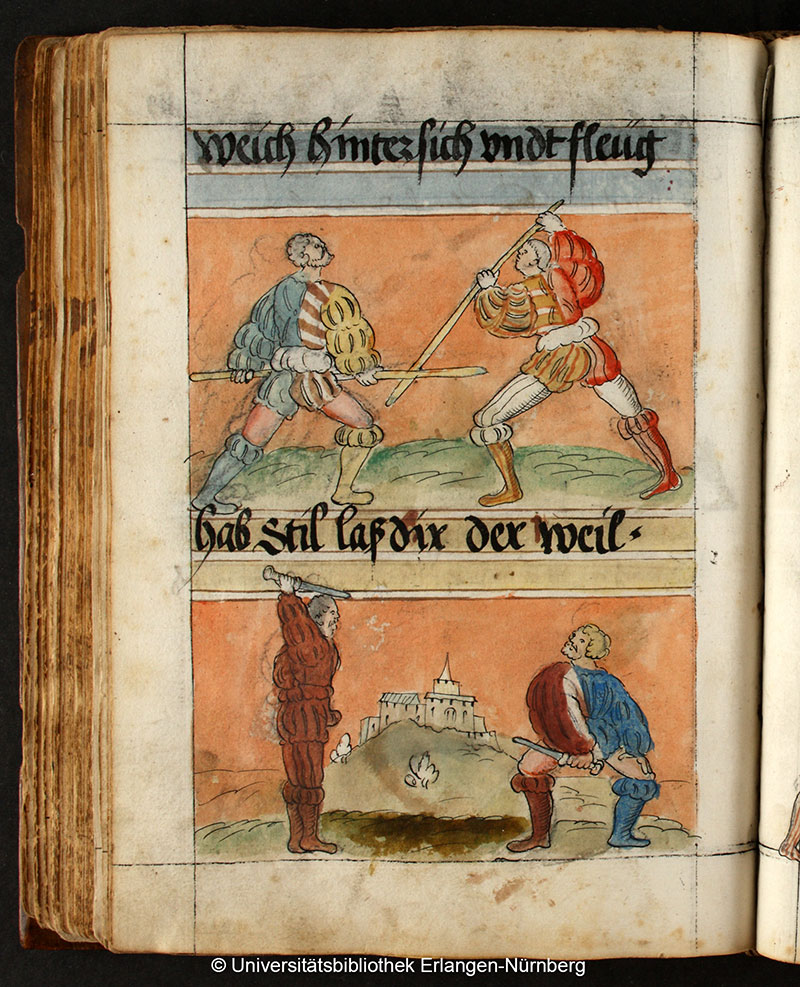
weich hintersich vndt fleüg
hab Stil laß dir der weil •
Give way backwards and retreat.
Hold still; wait a while.
120r
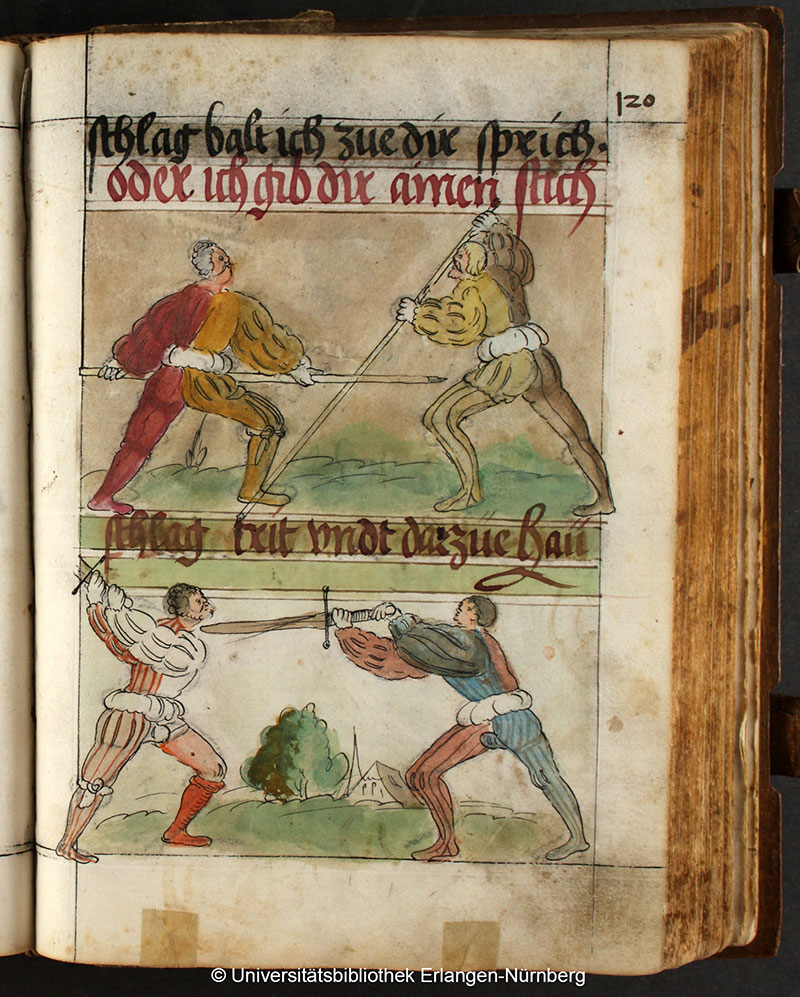
schlag balt ich zue dir sprich •
oder ich gib dir ainen stich
schlag trit vndt darzüe haü
Strike quickly, I tell you; or I will give you a thrust.
Strike, step —and cut together with [him].
120v
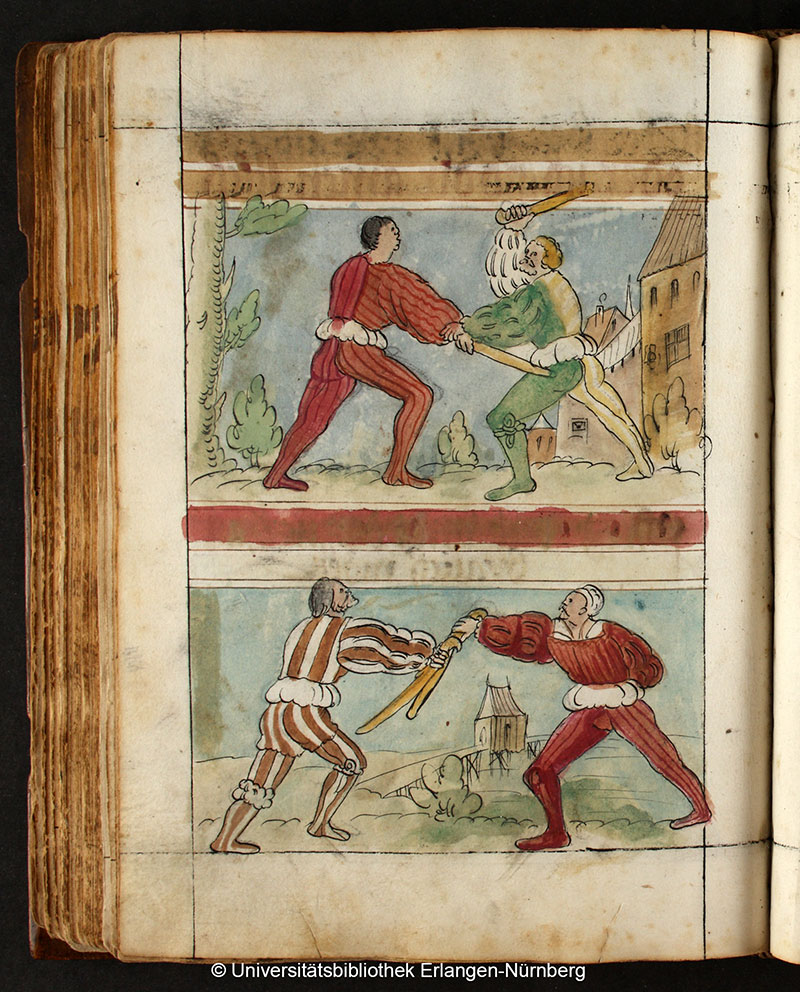
[Kein Text]
[No text]
121r
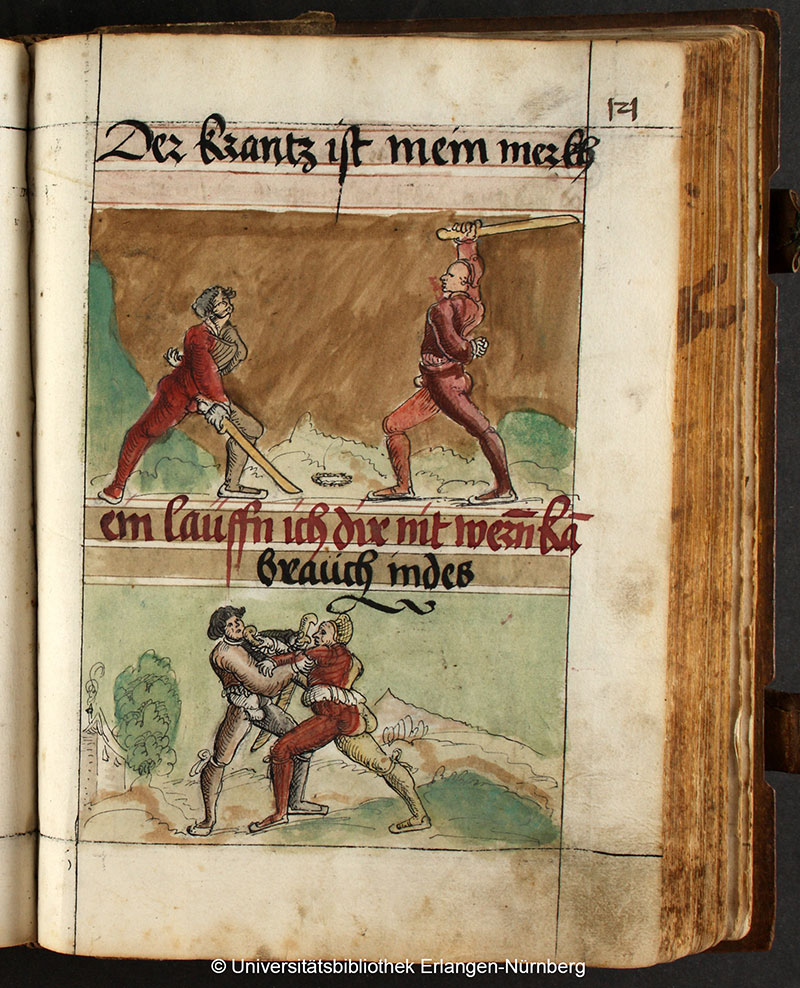
Der krantz ist mein merkh
ein laüffen ich dir nit wer(e)n ka(n)
brauch indes
Take note, that wreath is mine!
I cannot prevent you from closing in; use ‘Indes’.
121v
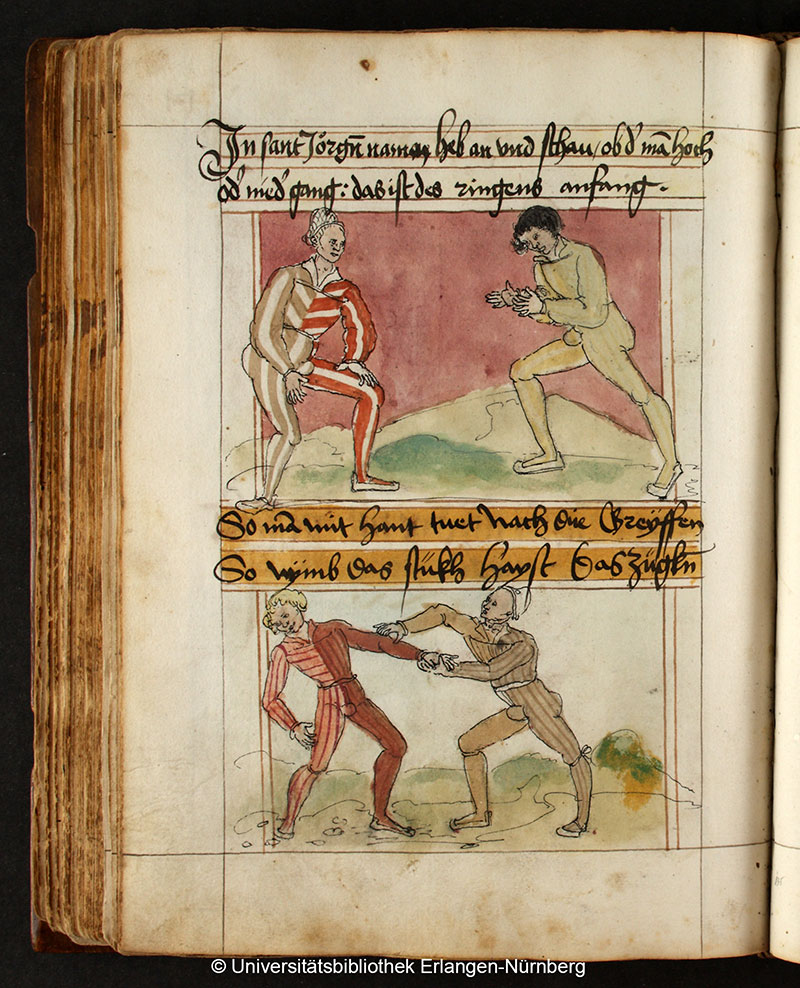
In sant Jŏrg(e)n namen heb an vnd schau / ob d(er) ma(n) hoch od(er) nied(er) gang: das ist des ringens anfang •
So ma(n) mit hant tuet Nach dir Greyffen
So nymb das stükh hayst das zügk(e)n
In Saint George’s name, begin; and watch to see whether your opponent goes high or low: That is the beginning [lesson] of wrestling.
If he grabs at you with his hand, then use the technique that is called Zucken (pulling).
122r
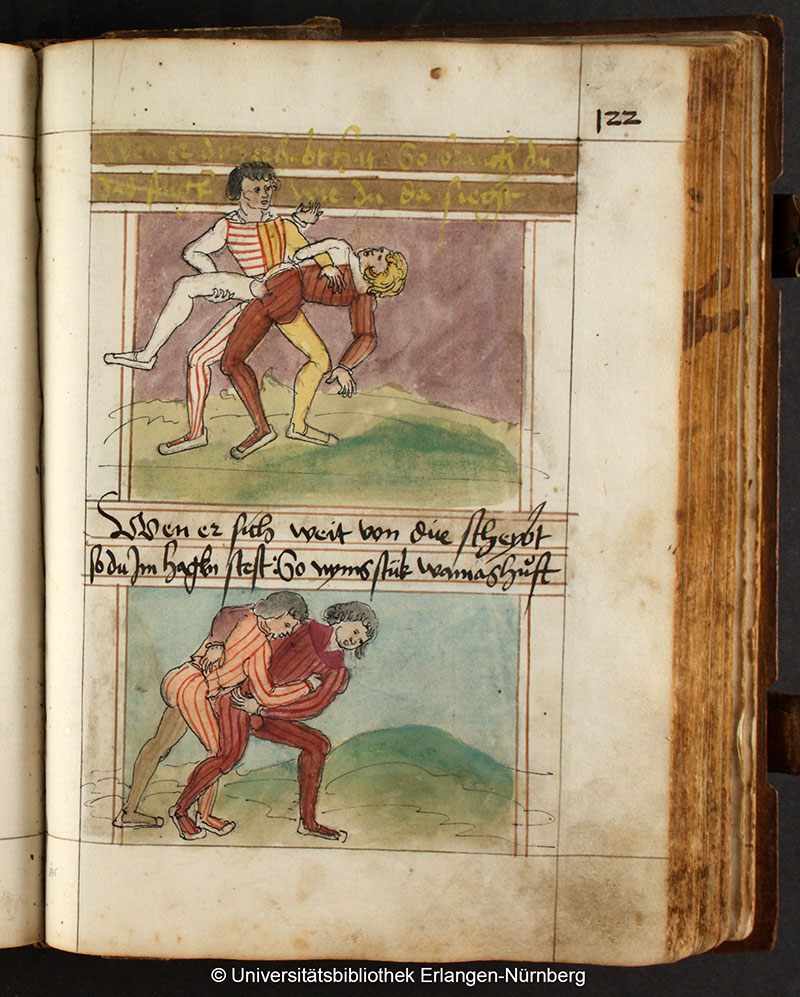
Wen er dich erhebt hat: So brauch du das stugk wie du da siegst
Wen er sich weit von dir scheybt so du Im hagkn stest: So nyms stük wamashuft
If he has lifted you up, then use the technique which you see here.
If he shoves you away from him when you are in the Haken (hook), then grab a piece of his jacket near the hip.
122v
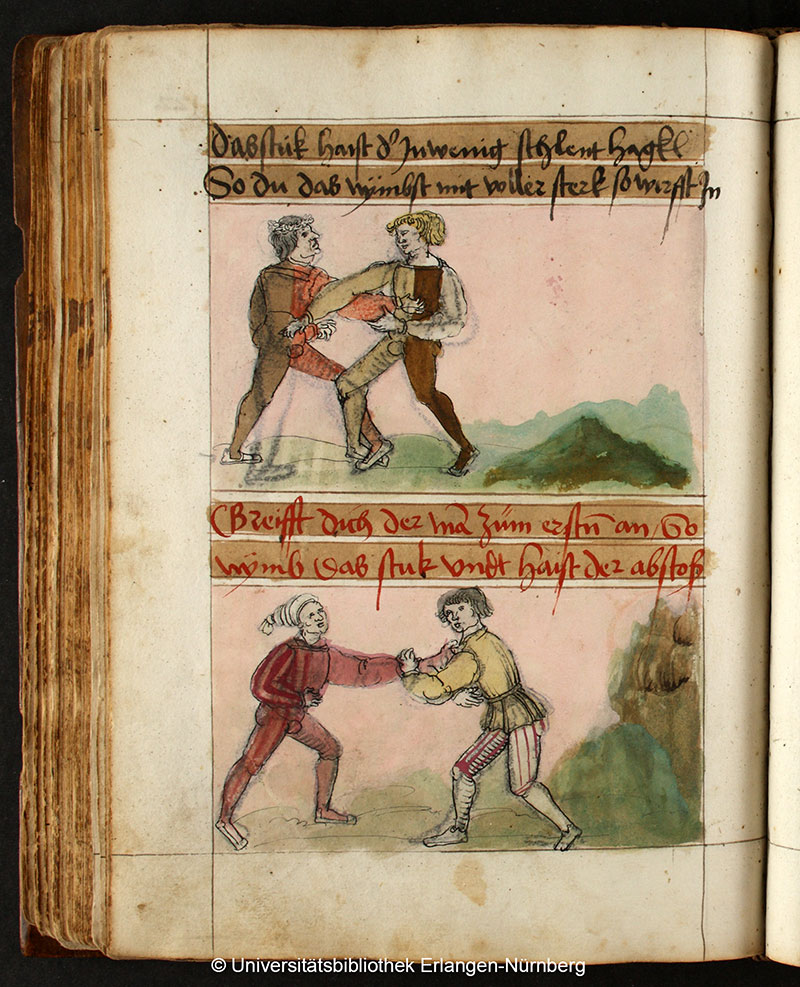
Das stuck haist d(er) Inwendig schlent hagkl
So du das nymbst mit voller sterk so wirfst In
Greifft dich der ma(n) züm erst(e)n an / So nymb das stuk vndt haist der abstoß
This technique is called the Inwendig Schlent Hagkl (inside [?] hook). If you use that at full force, you will throw him.
If your opponent grabs you first, then use this technique, which is called the Abstoss (shove-away).
123r
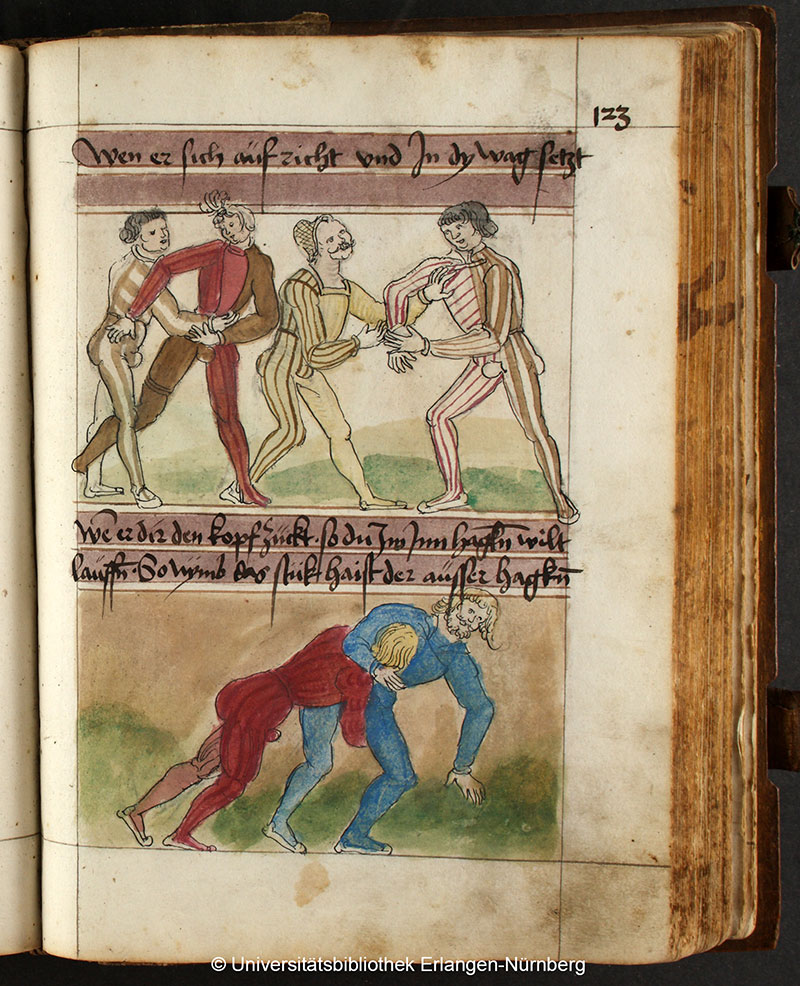
Wen er sich aüfricht vnd In dy wag setzt
we(n) er dir den kopf zückt • so du Im Inn hagk(e)n wilt lauff(e)n • So nymb das stük haist der aüsser hagk(e)n
If he stands upright and positions himself in the Balance.
If he pulls your head [under his arm] when you try to run in at him with the Hacken (hook), then use the technique called the Aüsser Hacken (outer hook).
123v
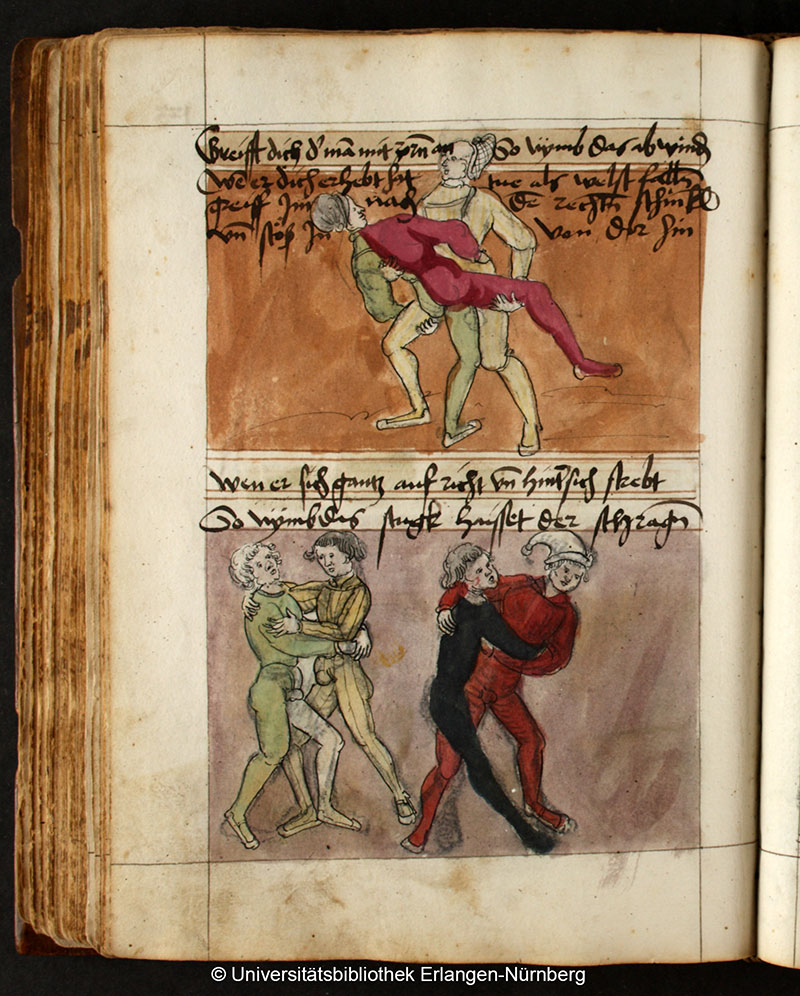
Greifft dich d(er) ma(n) mit zor(e)n an So nymb das abwind(en)
We(n) er dich erhebt hat tue als welst fall(e)n greiff Im nach de(m) recht(e)n schink(e)l vn(d) stöß In von dir hin
Wen er sich gantz aufricht vn(d) hint(er) sich strebt So nymb das stugk haisset der schrag(e)n
If your opponent grabs hold of you with fury, then use the Abwinden (turning aside). If he has lifted you up, act as if you are going to fall, [but instead] grasp hold of his right thigh and shove him away from you.
If he stands completely upright and strains backwards, then use the technique called the Schragen.
124r
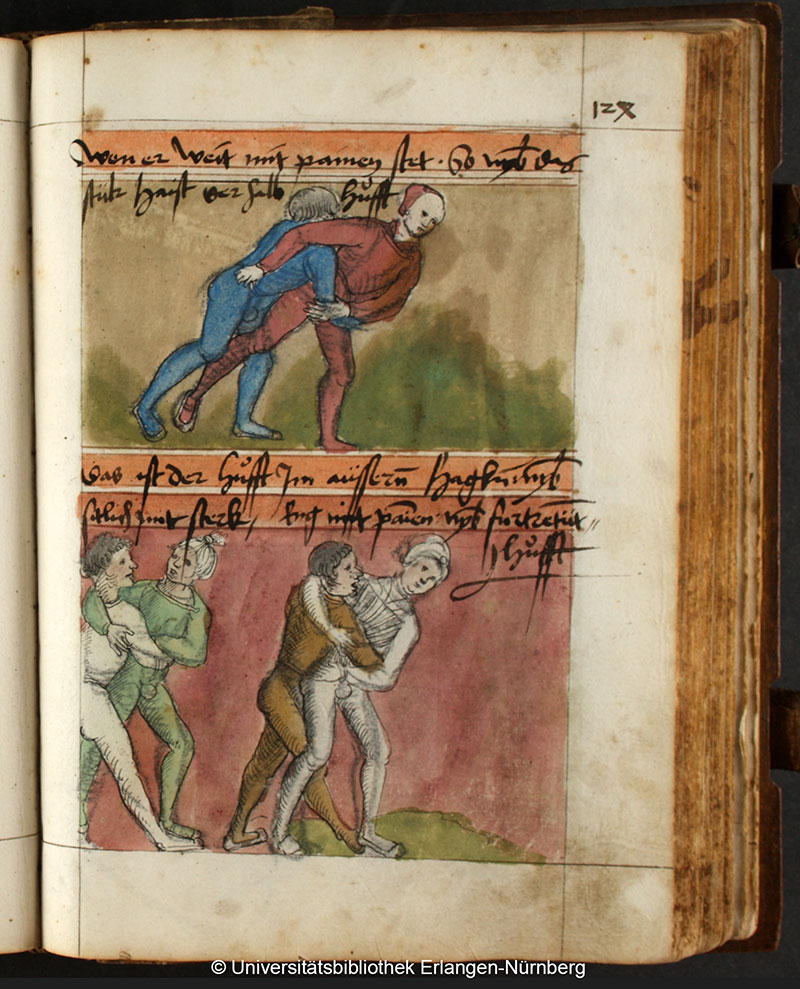
Wen er weit mit painen stet • So ny(m)b das stük haist der halb hufft
das ist der hufft Im aüsser(e)n hagk(e)n ny(m)b solich mit sterk / Rng mit pai(n)en: ny(m)b furtretüt [?] hufft
If he stands with his legs wide apart, then use the technique called the Halb Hufft (half hip).
This is the hip in the Aüsser Hacken (outer hook). Use this with force. Wrestle with the legs and step forwards [to the?] hip.
124v
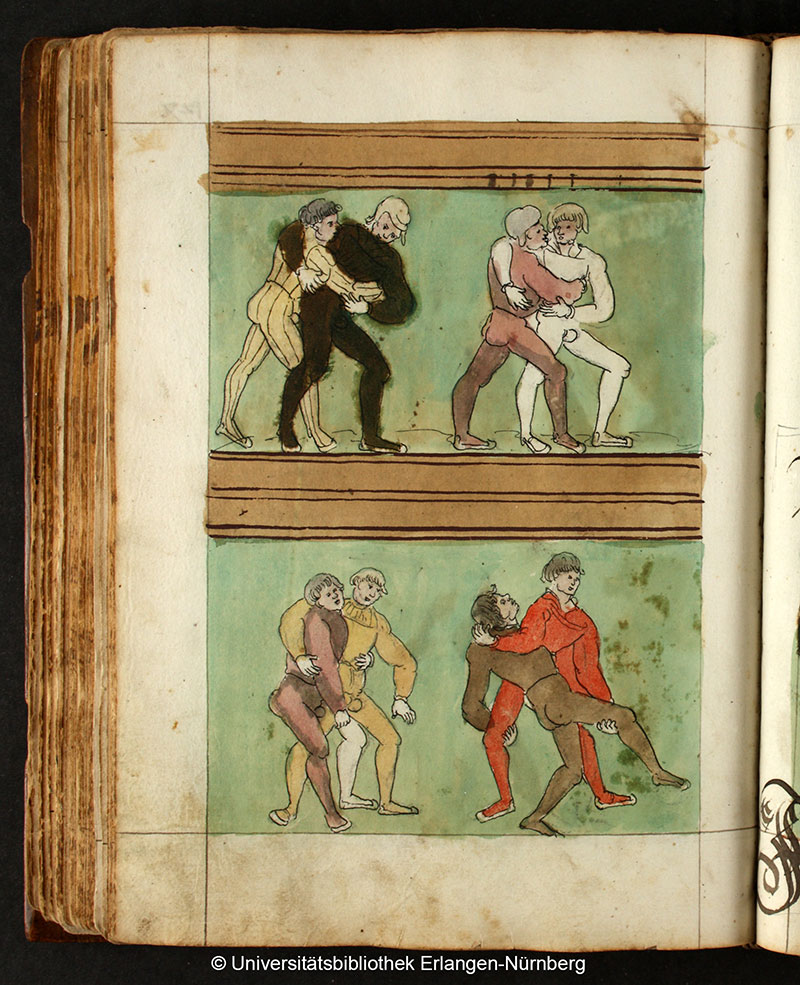
[Kein Text]
[No text]
125r
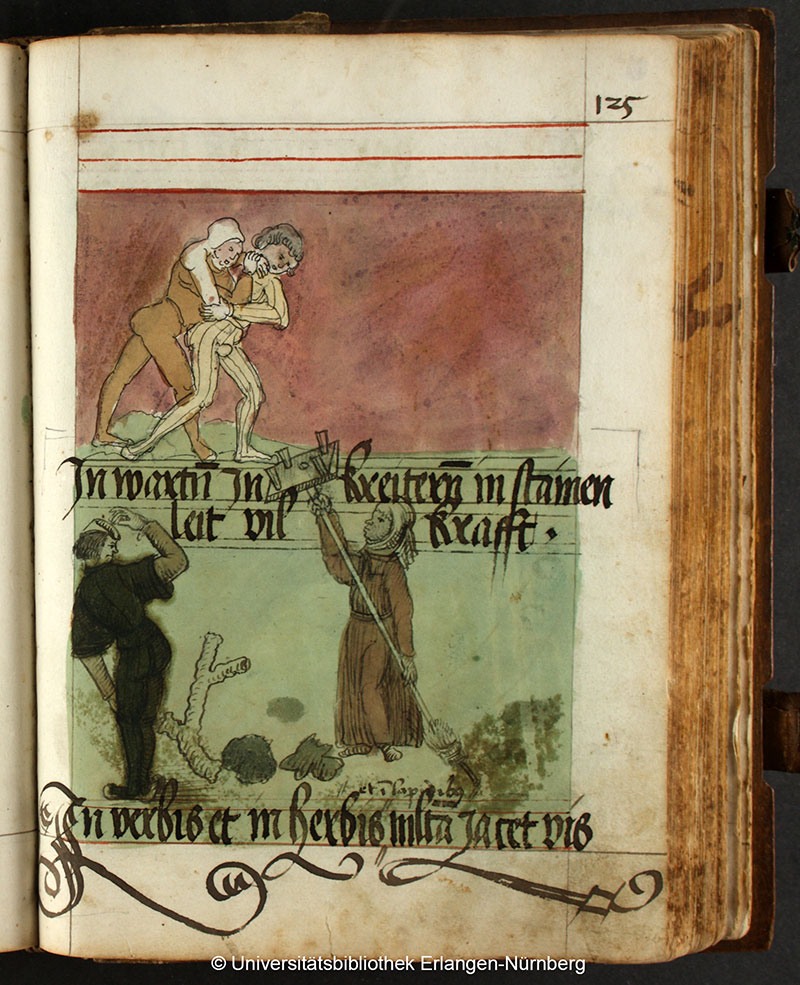
In wart(e)n In kreiter(e)n in stainen leit vil krafft •
In verbis et in herbis et i(n) lapidib(us) m(u)lta jacet vis
In words, in herbs, and in stones lies much power.


